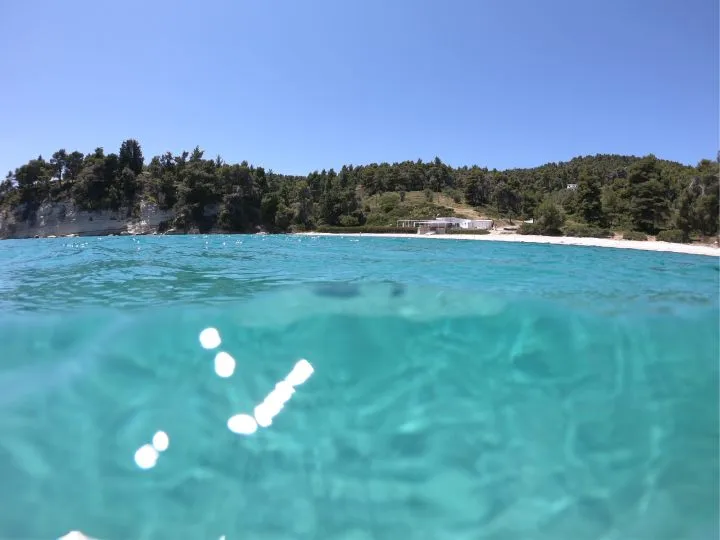Have you ever wondered about the differences between sailing in Greece and Croatia? Both destinations boast crystal-clear waters, breathtaking coastlines, historic seaside towns, and stunning island landscapes, but choosing the perfect spot for your next sailing holiday can be challenging.
With thousands of islands, world-class marinas, vibrant nightlife, and hidden anchorages, each country offers a unique sailing experience. Whether you're looking for adventurous island-hopping, cultural exploration, or a relaxing getaway, we've got the answers to help you decide!

Did you know that Croatia is home to over 1,200 islands, cliffs, and reefs? This sailor’s paradise offers some of the best island-hopping routes in the world, with short sailing distances and well-protected anchorages.
Here are the top three sailing regions along the Dalmatian Coast:
Croatia’s short sailing distances make island-hopping the best way to explore. Stop by Brač and Vis for secluded bays and exquisite waterfront dining, or head to Hvar for a mix of beach clubs, history, and nightlife. For those seeking adventure, the Pakleni Islands offer some of the most picturesque anchorages in the Adriatic. Whether you want to party, unwind, or stay active with hiking and water sports, Croatia has it all.
📍 Plan your Croatia sailing adventure:

With over 6,000 islands and the 10th longest coastline in the world, Greece offers endless sailing opportunities. From sun-kissed beaches and ancient ruins to lively island towns, one trip to Greece is never enough!
Here’s a breakdown of the five main Greek sailing regions and their must-visit islands:
Each region offers something unique, from Santorini’s volcanic beaches to Mykonos’ world-famous nightlife and Corfu’s historic Old Town. With so many incredible sailing routes, choosing the perfect itinerary can be overwhelming. That’s where Yacht4Less comes in—our yacht charter experts will help you find the ideal sailing destination based on your preferences, group size, and experience level.
📍 Plan your Greece sailing holiday:

Are you a first-time sailor or someone looking for an easy, stress-free sailing experience? If so, both Greece and Croatia offer beginner-friendly sailing conditions, making them ideal destinations for your first yacht charter.
Both countries enjoy a warm Mediterranean climate, with temperatures reaching up to 30°C (86°F) during the dayand around 24°C (75°F) at night in peak summer (July and August). You can expect long sunny days, predictable winds, and minimal rainfall, ensuring smooth sailing conditions. However, each country has its own famous windsthat every sailor should be aware of.
When sailing in Greece, it's important to be mindful of the Meltemi wind, especially in certain regions.
What is the Meltemi?
Best Greek sailing areas for beginners:
For a calmer sailing experience, we recommend choosing more sheltered waters, such as:
✔ Saronic & Argolic Gulf – Offers protected sailing routes and short island-hopping distances.
✔ Ionian Islands – Generally less affected by strong winds, making them ideal for first-time sailors.
Croatia also provides fantastic conditions for beginner sailors, but it's good to be aware of the Bura wind.
What is the Bura?
Best Croatian sailing areas for beginners:
✔ Southern Dalmatia (Dubrovnik, Korčula, Mljet) – Offers calm, predictable sailing conditions.
✔ Central Dalmatia (Split, Hvar, Brač, Vis) – A great choice for smooth sailing with short island-hopping routes.
Both Greece and Croatia offer excellent conditions for beginner sailors, but the best choice depends on the season and your preferred sailing style:
✔ For sheltered, easy sailing – Greece’s Ionian Islands and Saronic Gulf or Croatia’s Dalmatian Coast.
✔ For a bit more adventure – Greece’s Cyclades Islands (with Meltemi winds) or Croatia’s North Dalmatian coast(with occasional Bura winds).

When planning a sailing holiday, one of the key factors to consider is budget. Both Greece and Croatia offer a wide range of yacht charter options, but which destination is more affordable?
While both countries provide excellent value for money, there are notable cost differences in areas such as charter prices, marina fees, dining, and provisioning.
The cost of chartering a sailing yacht or catamaran in both countries depends on factors such as boat size, seasonality, and departure location. However, on average:
💡 TIP: To find the best charter deals, book your yacht early or travel outside of peak season (June-August) when prices are lower.
Greece:
✔ Mooring fees in Greece are generally lower than in Croatia.
✔ In many locations, anchoring in bays is free, and smaller ports charge minimal fees for mooring.
✔ The exception is high-demand areas like Santorini or Mykonos, where docking costs can be higher.
Croatia:
✔ Croatia has some of the most modern marinas in the Mediterranean, but this comes at a cost.
✔ Expect to pay higher mooring fees, especially in premium marinas like ACI Dubrovnik, Hvar, and Split.
✔ Anchoring is possible in some areas, but designated mooring fields may require a fee.
💡 TIP: If you’re on a budget, anchoring in bays or choosing smaller harbors can help reduce costs in both countries.
📍 Check marina facilities & fees here:
Another major cost factor when sailing is food & drink. So how do Greece and Croatia compare?
✔ Greece is more affordable for dining out and provisioning. You’ll find cheaper tavernas, local markets, and fresh seafood at lower prices.
✔ Croatia is slightly more expensive, particularly in tourist-heavy islands like Hvar & Dubrovnik, where restaurants tend to charge premium prices.
💡 TIP: Stock up on groceries in larger towns before heading to smaller islands, where prices are often higher.
✔ For budget-friendly sailing → Greece is the better option due to lower mooring fees, cheaper dining, and affordable charter options.
✔ For premium yacht charters & luxury experiences → Croatia is ideal, especially if you prefer high-end marinas and crewed yacht services.
Ultimately, both Greece and Croatia offer fantastic sailing experiences for all budgets. Whether you're looking for affordable adventure sailing or a high-end luxury yacht charter, Yacht4Less will help you find the best option for your budget.
One of the biggest concerns for travelers when sailing abroad is whether English is widely spoken. The good news is that in both Croatia and Greece, English is commonly spoken, especially in tourist areas, marinas, and restaurants. However, learning a few local words and phrases can go a long way in enhancing your experience and impressing the locals!
✔ Yes! English is widely spoken in Croatia, particularly in coastal regions and tourist hotspots.
✔ Even on smaller islands, you’ll find locals who can communicate in English, making it easy to ask for directions, restaurant recommendations, or sailing advice.
✔ Many older generations on the islands also have a basic understanding of English and are friendly and willing to help.
💡 Croatian Phrases to Impress the Locals:
Locals appreciate when visitors make an effort, and a simple “Hvala” (thank you) can go a long way in making a great impression!
✔ Yes! More than half of Greeks speak English fluently, particularly in tourist-heavy islands and cities.
✔ In smaller, less touristy islands and rural areas, English may be less commonly spoken, but locals will still try their best to help you.
✔ Greek hospitality is legendary, so even if there is a language barrier, expect friendly smiles and gestures to guide you in the right direction!
💡 Greek Phrases to Know:
Even if you only learn a few basic words, Greek locals will appreciate your effort and might even reward you with a warm smile or an extra glass of wine! 🍷😃
✔ Croatia is slightly easier for English speakers, as English is almost universally spoken in marinas, restaurants, and island communities.
✔ Greece is also very English-friendly, but in more remote areas, learning a few Greek words can be helpful.
Bottom Line: Neither country requires you to learn the language, but knowing a few local words can make your sailing adventure even more enjoyable!

Deciding between sailing in Greece or Croatia? The truth is—both destinations offer incredible sailing experiences, but the best choice depends on your travel preferences, sailing style, and trip duration.
✔ Choose Croatia if you prefer:
✔ Choose Greece if you prefer:
📍 Flight Availability May Also Influence Your Choice
Consider checking flights to major Croatian airports like Split, Zadar, and Dubrovnik, or Greek airports like Athens, Kos, Rhodes, Corfu, Preveza, Skiathos, and Volos to find the best connection for your trip.
We know—it’s a tough choice! But the great news is that you can’t go wrong with either. Both destinations offer breathtaking scenery, rich history, and unforgettable sailing adventures.
Don’t wait any longer—pick your destination, contact Yacht4Less, and get ready for a once-in-a-lifetime sailing holiday!